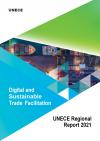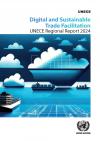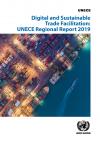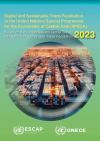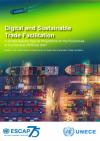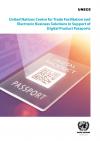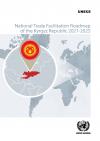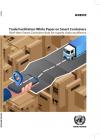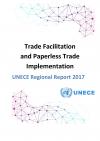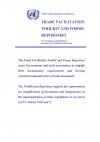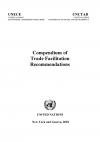Publications
Displaying Results 1 - 20 of 1113
- English
The UNECE Regional Report 2021 on Digital and Sustainable Trade Facilitation has been produced based on the results of the United Nations Global Survey on Digital and Sustainable Trade Facilitation. The Global Survey (ECE/TRADE/467) is a joint initiative under the Joint United Nations Regional Commissions’ Approach,
- English
The fifth United Nations Global Survey on Digital and Sustainable Trade Facilitation, jointly conducted by the five United Nations Regional Commissions and UNCTAD, offers an in-depth and comparative analysis of the implementation of 60 trade facilitation measures in over 160 countries worldwide in 2023. Aside from measures in the WTO TFA, the survey covers the implementation of cutting-edge
- English
It is fair to say that trade facilitation is a key policy priority for most if not all the trading nations. The benefits for implementing trade facilitation provisions such as the ones in the World Trade Organization’s (WTO) Trade Facilitation Agreement are well documented. However, the need for measuring progress of the provisions remain as strong as ever. Since 2015 the United Nations
- English
This report is part of a global survey effort on the implementation of trade facilitation and paperless trade measures, undertaken jointly by the five United Nations Regional Commissions for Africa (ECA), Europe (ECE), Asia and the Pacific (ESCAP), Latin America and the Caribbean (ECLAC) and West Asia (ESCWA) as well as the United Nations Conference on Trade and Development (UNCTAD).
This report
- English
The report presents results of the 2021 United Nations Global Survey on Digital and Sustainable Trade Facilitation for six participants in United Nations Special Programme for the Economies of Central Asia (SPECA), namely Afghanistan, Azerbaijan, Kazakhstan, Kyrgyzstan, Tajikistan and Uzbekistan, reviewing the progress of trade facilitation reforms and provides a detailed analysis based on 58
- English
Digital tools can play an important role in accelerating the shift to a circular economy. Digital tools can increase transparency along value chains and provide information, which in turn can help to extend the lifecycle of products.
Digital Product Passports (DPPs), for example, can inform consumers and businesses about products, materials, the conditions under which they are produced and their
- English
The National Trade Facilitation Roadmap of the Kyrgyz Republic 2021-2025 serves as the guiding framework for comprehensive national trade facilitation reforms over a five-year period. The Roadmap sets out a strategic vision and respective goals and activities for the Kyrgyz Republic to implement. Through these activities the Kyrgyz Republic can transform its trade facilitation services to
- English
The UN/CEFACT Blockchain White Paper Project oversaw the preparation of two White Papers. The first, which looks at Blockchains’ impact on the technical standards work of UN/CEFACT, has been published (ECE/TRADE/C/CEFACT/2019/8). This is an update of the second White Paper, which looks at how Blockchain
- English
ECE/TRADE/299: Trade Facilitation: The Challenges for Growth and Development [pdf format -- 344 pages]
- English
Technology is entering into every aspect of the supply chain and providing performant and innovative tools. As many are just starting to talk about the dematerialization of certain documents used in trade and transport, others are investigating how devices can communicate information directly to the rest of the supply chain without human intervention. Smart Containers are taking the digital
- English
Within the United Nations Economic Commission for Europe (UNECE), the United Nations Centre for Trade Facilitation and Electronic Business (UN/CEFACT) has developed a series of some 30 recommendations and standards that are used worldwide to simplify, standardize and harmonize trade procedures and information flows. Many of these are now international standards of the International
- English
This Recommendation, first published in 1974, has been revised in light of the changing context for Trade Facilitation and the adoption of the Trade Facilitation Agreement of the World Trade Organization. The revised Recommendation suggests that governments establish national trade facilitation bodies (NTFB) as an indispensable component of trade policy formation which
- English
Trade facilitation is a key factor in national competitiveness and in the economic development of countries. At the same time, the development of a simplified and automated trade environment is a challenging reform programme for any country. It requires strategic vision, leadership, change management, collaboration, and coordination between various stakeholders. It is also a well-known fact
- English
Public-Private Partnerships (PPPs) is a possible solution for financing and implementing public projects. These projects allow the public sector to benefit from private sector funding, expertise and capacity while allowing the private sector to partner with the public sector in providing critical public services. There are a number of areas within Trade Facilitation
- English
Within the United Nations Economic Commission for Europe (UNECE), the United Nations Centre for Trade Facilitation and Electronic Business (UN/CEFACT) has developed a series of some 30 recommendations and standards that are used worldwide to simplify, standardize and harmonize trade procedures and information flows. Many of these are now international standards of the International Organization
- English
This Glossary (ECE/TRADE/377/Rev.2) represents an English-Russian-Chinese dictionary of terms that are widely used in trade facilitation. This is the third, revised and completed edition including new terms in trade facilitation and electronic business. For the first time it incorporates a Chinese version of the terms, thus
- English
Addresses the income distribution impact of trade facilitation in developing countries. The matter is considered from a general perspective, drawing on economic analysis and practical experience to construct a broad framework to explain the links between trade facilitation, income distribution and poverty Readmore
- English
Facilitating trade is about streamlining and simplifying international trade, particularly import and export procedures, transit requirements and procedures applied by Customs and other agencies (UNECE-UN/CEFACT). With the rapid increase of international trade, thanks in part to the reduction of tariffs and quotas, it has become evident that for countries to benefit from open global markets it
- English
The Trade Facilitation Toolkit and Forms Repository assist Governments and trade associations to simplify their documentary requirements and develop consistent national series of trade documents. The Toolkit and Repository support the requirements for simplification of documents and transparency in the implementation of trade regulations as set out in GATT Articles VIII and X.
- English
Intended to be used as a reference by those engaged in simplifying, harmonizing and rationalizing trade procedures and practices. It is also useful for industry, commerce, transport, administrations and organizations, to create awareness of the possibilities that exist in the area of facilitation and harmonization of trade and transport
